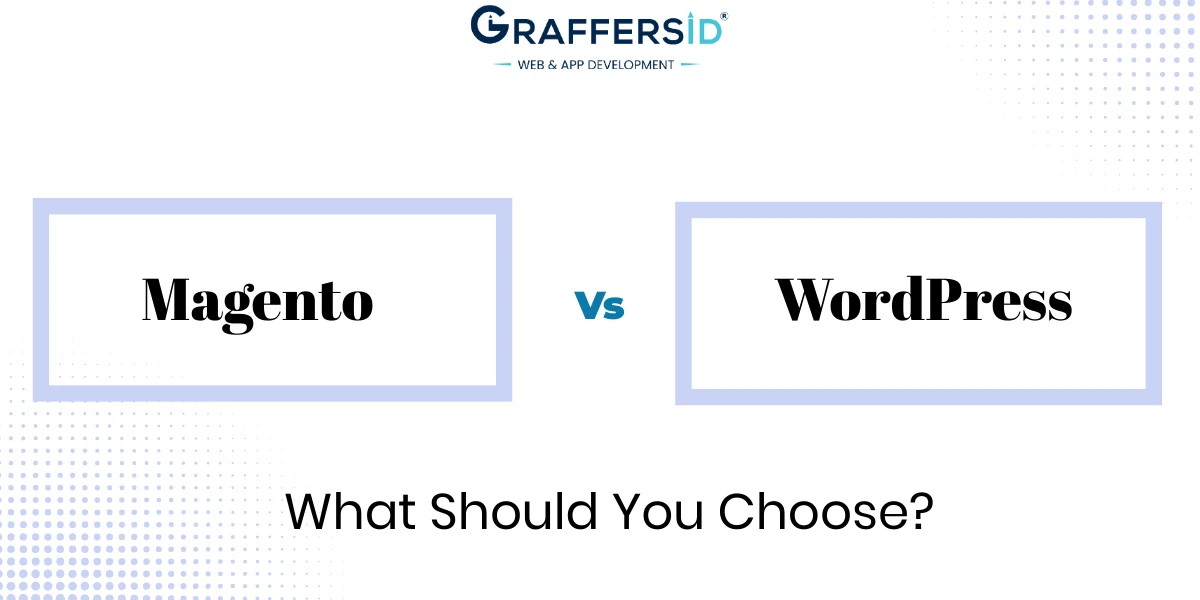Gone are those days when creating a website was considered an overwhelming process. Today, we are in the technology-mediated era, and for the purpose mentioned above, we employ a content management system to get our hands on ready-made websites. Read along with the article to compare Magento vs. WordPress in detail.
What are Content Management Systems?
A content management system, popularly abbreviated as CMS, is a renowned application that provides its users with the facility to manage website content. The not-so-published content is saved in a database, allowing the user to read, edit, rewrite, and omit some sentences. WordPress and Magento are both examples of CMS. And both of them possess some special qualities over the other, and it is recommended to use them for your project wisely.
If you want to add e-commerce features to your already existing website, then you can employ Magento for the same purpose. On the other hand, WordPress cannot provide such facilities to its users. Both of these are powerful open-source tools, but if you are a beginner-level developer, then this question must’ve haunted you for days. Well, to understand the importance of such sites and their proper use, you should know what Magento and WordPress are and their benefits.
What is Magento?
Magento is an open-source CMS that is commonly written in PHP and, thus, is known to be a popular choice for all e-commerce brand-based websites. If the studies are to be believed, then Magento is known to be a top contributor in 33% of the top e-commerce websites.
The comprehensive yet popular e-commerce platform was made available for everyone’s use in the year 2008, and since its inception, it has enjoyed quite a popularity. And Magento, due to its features, has landed itself as the most used CMS tool, earning the spot number 4. Magento provides its users with extensions that are widely used by both first- and third-party website developers. The number of extensions is about 4000, and on installation, it is responsible for providing them with features such as automated store coupon distribution as well as multi-vendor functionality.
Moreover, you might have observed that there are two types of Magento available on Google, namely Magento 1 and Magento 2. Well, without second-guessing, Magento 2 is more powerful as compared to its previous version, and hence if you are wasting any more time thinking about both, then you shouldn’t.
Magento 2 further comes in its two popular versions, which are Magento Open Source as well as Magento Cloud. The former version of Magento, i.e., Magento open source, is free for download. This is best for the small businesses that have hired developers on their behalf. Moreover, as the name implies, this version is open-source, which allows a plethora of added features such as
1. Coupon Distribution
2. A plethora of Users
3. Product categories addition, cross-sell, and up-sell
4. Provide community support
On the other hand, the latter version of Magento is paid as well as tailor-made to provide large businesses with better performance as well as scalability features. Moreover, this version is more limited to the likes of the experts who know their way around this tool. This version provides you with hundreds of extensions that can let you have more control over this feature.
Pros of Magento
- High scalability
- Advanced e-commerce capabilities
Cons of Magento
- Steeper learning curve
- Higher initial setup costs
What is WordPress?
WordPress was developed in the year 2003 for blogging. And, since then, it has ventured into numerous realms. WordPress is known to be the most used CMS today, and why not? It offers exemplary user experiences and the ability to customize the website according to your likes. Therefore, it accounts for creating the most websites.
Not only this, but even if it is limited by some criteria, it is fulfilled by the use of plug-ins. Today, there are more than 56,000 extensions that are available on its marketplace, which makes WordPress one of the most flexible and easy sources to create a website template.
Pros of WordPress
- User-friendly interface
- Extensive customization options
Cons of WordPress
- Limited e-commerce features
- Scalability challenges for large enterprises
Key Features: Magento vs. WordPress
1. Type of websites built
Magento is used to create complex e-commerce websites. On the other hand, WordPress is used to create simple business websites as well as small e-commerce sites employing the use of third-party plug-ins. It has been witnessed that Magento has some features, such as adding varied products to the catalog and coupon distribution, which further make the development and management of the e-commerce website quite easy.
2. Security
Well, this is one of the most wanted features. And, if you have a business or an e-commerce website involving multiple transactions, this is a feature you cannot take for granted. Speaking of security in Magento, it offers an advanced level of data protection. Moreover, the core code for both Magento and WordPress is highly secure, but WordPress uses a third-party plug-in to provide its users with advantages. The security of such a plug-in is still in question. In such cases, it should not be used for e-commerce platforms.
On the other hand, Magento is known to provide the features without the use of third-party plugins. Therefore, it creates a safe and secure platform for e-commerce operations. Even if you have a doubt, you can always scan the Magento website for free using a tool. This action not only removes doubts from the minds of the users but also makes them aware that there are no sorts of vulnerabilities.
3. Process of installation
As discussed before, you need to buy a paid subscription to use Magento, which has two different versions. The users are experts who want to create complex websites. Therefore, the use of this website, as well as the installation process, is not that easy. WordPress, on the other hand, is a free tool and is quite easy to use and has a simple installation process.
4. SEO
One of the requisites of a business on its website is the ability to attract relevant traffic using on-page and off-page techniques. But, no matter how hard you try, some of the websites fail to lure the target audience. You may ask why. The answer is simple: a website must be optimized in terms of content, images, and layout to be SEO friendly.
Magento has some built-in plug-ins that allow search engine optimization. But WordPress depends upon the third-party plug-in to initiate this process. One of the plug-ins that it highly endorses is Yoast SEO. Moreover, WordPress was built as a blogging site, which implies that it provides its users with ample suggestions about meta-titles, tags, and descriptions, and even a facility to tweak them accordingly. Optimized content plays a huge part in the ability to perform SEO.
In simpler terms, both websites have something in store for their users, which, upon use, can help them drive traffic better with SEO.
5. Templates
If you are looking to design a customized website, then you should opt for WordPress. WordPress is built in a way that it can offer its users a variety of design templates to choose from. Not only this, but if you are looking for a customized business website or an innovative user experience, then you should consider WordPress. Magento, on the contrary, focuses more on features and convenience rather than the layout as a whole.
Cost Comparison: Magento vs. WordPress
The initial setup costs and ongoing maintenance expenses differ between Magento and WordPress. Magento’s advanced features come at a higher price, making it more suitable for businesses with substantial budgets. WordPress, being open-source, is generally more budget-friendly.
Combining both Magento vs. WordPress
Magento and WordPress are two of the most widely used CMSs for website development. And, choosing between the two is one of the most daunting decisions one has to make. But what if you own an e-commerce site but also need to tell your story to your audience? One way of foretelling your story is by writing blogs. What then? WP engines can combine Magento-created websites with WordPress blogs.
Final Words
Well, the advantages and disadvantages of one over the other are a simmering debate that will continue for ages!
If you are wondering which CMS can serve your purpose, then look no further and contact us! We are a renowned name that is known to offer our clients premium offshore website development services in India. For the same purpose, we have the best technological stack that can help you in attaining your goals.



